Related Research Articles
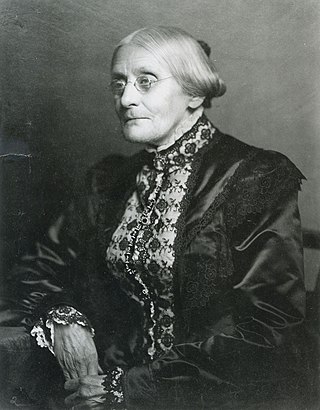
Susan B. Anthony was an American social reformer and women's rights activist who played a pivotal role in the women's suffrage movement. Born into a Quaker family committed to social equality, she collected anti-slavery petitions at the age of 17. In 1856, she became the New York state agent for the American Anti-Slavery Society.

The Nineteenth Amendment to the United States Constitution prohibits the United States and its states from denying the right to vote to citizens of the United States on the basis of sex, in effect recognizing the right of women to vote. The amendment was the culmination of a decades-long movement for women's suffrage in the United States, at both the state and national levels, and was part of the worldwide movement towards women's suffrage and part of the wider women's rights movement. The first women's suffrage amendment was introduced in Congress in 1878. However, a suffrage amendment did not pass the House of Representatives until May 21, 1919, which was quickly followed by the Senate, on June 4, 1919. It was then submitted to the states for ratification, achieving the requisite 36 ratifications to secure adoption, and thereby go into effect, on August 18, 1920. The Nineteenth Amendment's adoption was certified on August 26, 1920.
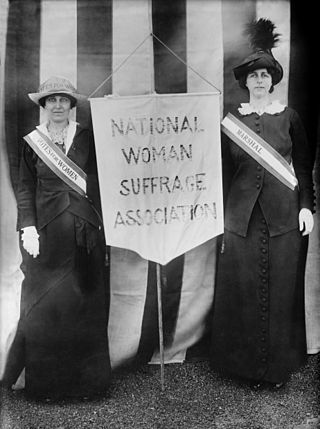
The National Woman Suffrage Association (NWSA) was formed on May 15, 1869, to work for women's suffrage in the United States. Its main leaders were Susan B. Anthony and Elizabeth Cady Stanton. It was created after the women's rights movement split over the proposed Fifteenth Amendment to the U. S. Constitution, which would in effect extend voting rights to black men. One wing of the movement supported the amendment while the other, the wing that formed the NWSA, opposed it, insisting that voting rights be extended to all women and all African Americans at the same time.
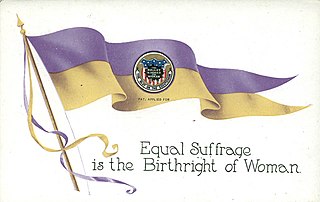
The National American Woman Suffrage Association (NAWSA) was an organization formed on February 18, 1890, to advocate in favor of women's suffrage in the United States. It was created by the merger of two existing organizations, the National Woman Suffrage Association (NWSA) and the American Woman Suffrage Association (AWSA). Its membership, which was about seven thousand at the time it was formed, eventually increased to two million, making it the largest voluntary organization in the nation. It played a pivotal role in the passing of the Nineteenth Amendment to the United States Constitution, which in 1920 guaranteed women's right to vote.
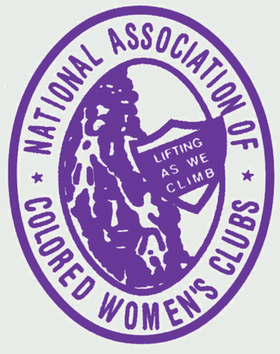
The National Association of Colored Women's Clubs (NACWC) is an American organization that was formed in July 1896 at the First Annual Convention of the National Federation of Afro-American Women in Washington, D.C., United States, by a merger of the National Federation of Afro-American Women, the Woman's Era Club of Boston, and the Colored Women's League of Washington, DC, at the call of Josephine St. Pierre Ruffin. From 1896 to 1904 it was known as the National Association of Colored Women (NACW). It adopted the motto "Lifting as we climb", to demonstrate to "an ignorant and suspicious world that our aims and interests are identical with those of all good aspiring women." When incorporated in 1904, NACW became known as the National Association of Colored Women's Clubs (NACWC).
Josephine St. Pierre Ruffin was a publisher, journalist, civil rights leader, suffragist, abolitionist, and editor of the Woman's Era, the first national newspaper published by and for African American women.

Women's suffrage, or the right of women to vote, was established in the United States over the course of the late 19th and early 20th centuries, first in various states and localities, then nationally in 1920 with the ratification of the 19th Amendment to the United States Constitution.
The American Woman Suffrage Association (AWSA) was a single-issue national organization formed in 1869 to work for women's suffrage in the United States. The AWSA lobbied state governments to enact laws granting or expanding women's right to vote in the United States. Lucy Stone, its most prominent leader, began publishing a newspaper in 1870 called the Woman's Journal. It was designed as the voice of the AWSA, and it eventually became a voice of the women's movement as a whole.
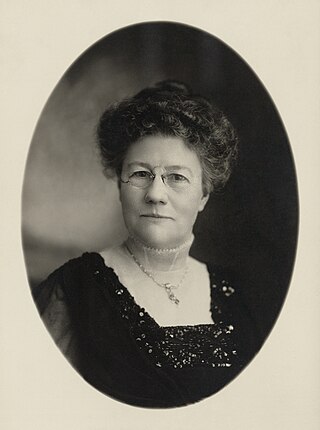
Ida Husted Harper was an American author, journalist, columnist, and suffragist, as well as the author of a three-volume biography of suffrage leader Susan B. Anthony at Anthony's request. Harper also co-edited and collaborated with Anthony on volume four (1902) of the six-volume History of Woman Suffrage and completed the project by solo writing volumes five and six (1922) after Anthony's death. In addition, Harper served as secretary of the Indiana chapter of the National Woman Suffrage Association, became a prominent figure in the women's suffrage movement in the U.S., and wrote columns on women's issues for numerous newspapers across the United States. Harper traveled extensively, delivered lectures in support of women's rights, handled press relations for a women's suffrage amendment in California, headed the National American Woman Suffrage Association's national press bureau in New York City and the editorial correspondence department of the Leslie Bureau of Suffrage Education in Washington, D.C., and chaired the press committee of the International Council of Women.
History of Woman Suffrage is a book that was produced by Elizabeth Cady Stanton, Susan B. Anthony, Matilda Joslyn Gage and Ida Husted Harper. Published in six volumes from 1881 to 1922, it is a history of the women's suffrage movement, primarily in the United States. Its more than 5700 pages are the major source for primary documentation about the women's suffrage movement from its beginnings through the ratification of the Nineteenth Amendment to the U.S. Constitution, which enfranchised women in the U.S. in 1920. Written from the viewpoint of the wing of the movement led by Stanton and Anthony, its coverage of rival groups and individuals is limited.
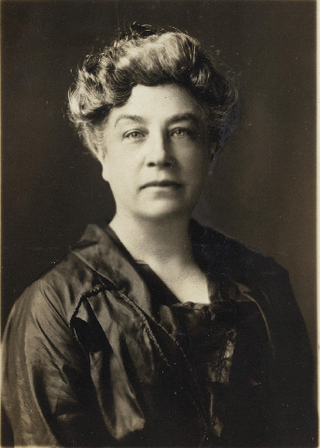
Kate M. Gordon was an American suffragist, civic leader, and one of the leading advocates of women's voting rights in the Southern United States. Gordon was the organizer of the Southern States Woman Suffrage Conference and directed the 1918 campaign for woman suffrage in the state of Louisiana, the first such statewide effort in the American South.
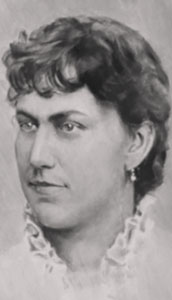
Ellen Battelle Dietrick (1847–1895) was an American suffragist and author who was active in the movement's organizations in Kentucky and Massachusetts. She was a core member of the group that published The Woman's Bible in the 1890s.

The women's club movement was a social movement that took place throughout the United States that established the idea that women had a moral duty and responsibility to transform public policy. While women's organizations had existed earlier, it was not until the Progressive era (1896–1917) that they came to be considered a movement. The first wave of the club movement during the progressive era was started by white, middle-class, Protestant women, and a second phase was led by African-American women.
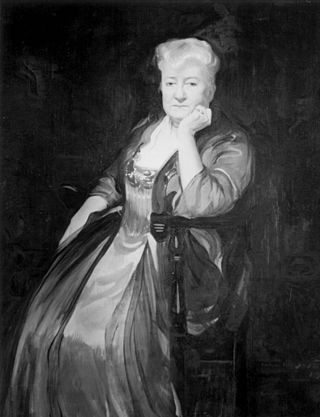
Sara Yorke Stevenson was an American archaeologist specializing in Egyptology, one of the founders of the University of Pennsylvania Museum of Archaeology and Anthropology, suffragist and women's rights activist, and a columnist for the Philadelphia Public Ledger.

Mary McHenry Keith (1855–1947) was an American lawyer and social justice advocate who was especially known for her work in the woman suffrage and animal rights movements. As the widow of the artist William Keith, she also was celebrated for her work cataloguing, preserving, and sharing his collected works.

Emily Parmely Collins was an American woman suffragist, women's rights activist, and writer of the long nineteenth century. She was the first woman in the United States to establish a society focused on woman suffrage and women's rights, in South Bristol, New York, in 1848. She was an early participant in the abolitionism movement, the temperance movement as well as a pioneer in the women's suffrage movement in the United States. She believed that the full development of a woman's capacities to be of supreme importance to the well-being of humanity; and advocated through the press for woman's educational, industrial and political rights. Collins died in 1909.

Helen Appo Cook was a wealthy, prominent African-American community activist in Washington, D.C., and a leader in the women's club movement. Cook was a founder and president of the Colored Women's League, which consolidated with another organization in 1896 to become the National Association of Colored Women (NACW), an organization still active in the 21st century. Cook supported voting rights and was a member of the Niagara Movement, which opposed racial segregation and African American disenfranchisement. In 1898, Cook publicly rebuked Susan B. Anthony, president of the National Woman's Suffrage Association, and requested she support universal suffrage following Anthony's speech at a U.S. Congress House Committee on Judiciary hearing.

The Southern States Woman Suffrage Conference was a group dedicated to winning voting rights for white women. The group consisted mainly of highly educated, middle and upper class white women of prominent families. They were originally part of the larger National American Woman Suffrage Association (NAWSA), but broke off in 1906. Prominent leaders in the group included Laura Clay and Kate Gordon, who supported and focused on local and state reforms rather than a national amendment. The group applied tactics like the Lost Cause, the belief that the Confederate cause was moral and just, and the Southern strategy, which appealed to white voters by promoting racism.
Sara Tew Mayo, M.D., (1869-1930) was a physician and humanitarian reformer in New Orleans, Louisiana, USA. She served the underprivileged and advanced the cause of women as physicians at a time and place when few women were practicing physicians as a result of gender discrimination. Mayo was a founding member of the New Orleans Hospital and Dispensary for Women and Children which was renamed the Sara Mayo Hospital in 1948.
Evelyn Walton Ordway was an American chemist, suffragist and university professor at Newcomb College in New Orleans. She was a chemistry and physics professor at Newcomb College for seven years and was active in the Louisiana women's suffrage movement, becoming the first president of the Louisiana State Suffrage Association.
References
- ↑ Segrave, Kerry (2016). The Hatpin Menace: American Women Armed and Fashionable, 1887–1920. Jefferson, North Carolina: McFarland. p. 169. ISBN 9781476622170.
- ↑ "Clubs and Kindred Organizations". Historical New Orleans. Retrieved 31 March 2018.
- ↑ Smith, Armantine (Winter 2002). "The History of the Woman's Suffrage Movement in Louisiana". Louisiana Law Review. 62 (2): 538.
- ↑ "Women to Vote in New Orleans". Woman's Column. Vol. 11, no. 2. 28 January 1898. p. 2. Retrieved 31 March 2018.
- 1 2 McConnaughy, Corrine M. (2013). The Woman Suffrage Movement in America: A Reassessment. Cambridge: Cambridge University Press. p. 180. ISBN 9781107013667.
- ↑ "Era Club's Year Closes". The Times-Democrat. 28 May 1905. Retrieved 2018-03-31– via Newspapers.com.
- ↑ Shepherd, Samuel C. (2005). "In Pursuit of Louisiana Progressives". Louisiana History: The Journal of the Louisiana Historical Association. 46 (4): 396. JSTOR 4234136.
- ↑ Harper, Ida Husted, ed. (1922). The History of Woman Suffrage. Vol. 5. National American Woman Suffrage Association. p. 17.
- ↑ "Dr. Sara Mayo – City Council Street Renaming Commission" . Retrieved 2021-05-12.